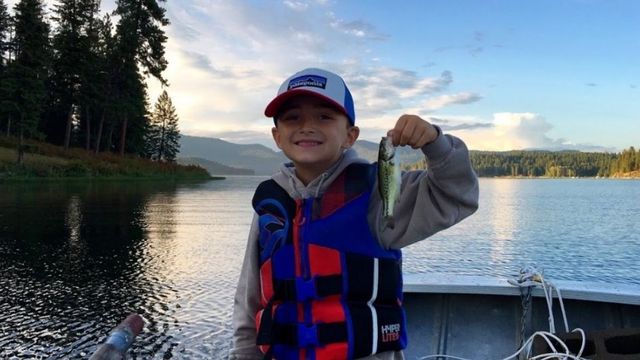
How To Take A Kid Fishing: 10 Tips You Need To Know
Whether it's a tournament fisherman chasing trophy tarpon or a casual angler who prefers bobbers and worms, chances are someone introduced those people to the sport of fishing.
Fishing is accessible, has a low entry cost, and gets people outside, but it's unquestionably tricky. It's not like basketball or soccer where you find a safe playing area, hand someone a ball, and tell them to go nuts. Fishing requires a bit more set-up for success, which is why we're here.
We put together ten easy tips for taking a young angler fishing. We hope this list can serve as both a guideline and motivation to share or learn the passion for fishing with a kid. Good luck, be patient, and prepare for the inevitable adversity that comes with taking a kid fishing.
1) Make The Day About Them
From start to finish, keep reminding yourself this day isn't about you. It's about the kids. Your objective is not catching fish but helping others attempt to catch fish and, more importantly, enjoy the day outside. Once you grasp this concept, it's going to make the day much more comfortable. Being out on a nice day with someone you care about is what it's about; catching fish is just the icing on the cake.
2) Start With An Easy Species
Start with a species of fish that are accessible and more willing to bite. For most of us, this is going to be panfish. Panfish is an umbrella term for a cluster of small warm-water fish known for their delicious taste and inability to outgrow a large frying pan.
Panfish species like bluegill (also known as bream) crappie, and perch are the most common panfish species targeted. The best way for a kid to learn fishing is with active and predictable fish like small panfish.
Catfish, carp, stocked trout, or bass are also viable options, especially if you're looking to advance to larger fish.
3) Keep The Gear Simple
Part of the experience of learning to fish is mastering the equipment you're using. To help make this process easier, you want to start with simple fishing gear like a spin cast or push-button fishing combo. Most kids fishing combos come spooled with fishing line and cost no more than $35.
Tie on a small hook, pinch a little split-shot weight roughly 6-10 inches above the hook, and then pinch on a small bobber float so that it's 12-18 inches above the hook. Attach natural baits like worms, minnows, corn, or bread to your hook and start targeting shallow water ponds and creeks. This technique will work virtually anywhere with shallow water panfish. If you need to target deeper water, try using a slip bobber rig.
4) Keep The Trip Under A Couple Hours
Keeping the fishing trip short will help prevent the youngster from getting burnt out. Sure, you might be able to fish for 6+ hours, but kids usually aren't as excited to spend that much time fishing. Go for short trips and continually lengthen your outings as the young anglers' comfort level and interest advances.
Pro tip: Fishing early in the morning or a couple of hours before sunset is the best time to catch fish.
5) End Things On A High Note
You always want to leave on top; this can be at a casino, work meeting, or a fishing outing with your kid. Instead of your day dwindling from a roaring fire to a dying bed of embers', you want to end things at the peak. End your day on a solid moment; this can be a fish catch, a joke, or something that randomly makes you feel good. End things positively, and the chances are that young anglers will want to come back for more.
6) Celebrate The Small Wins
A small win can be anything from identifying something in nature, tying on a lure, or helping you pick things up before you move to the next spot. Anytime that kid does something right, hit them with some positive affirmation and let them know you appreciate their help. This makes everyone feel involved and usually increases interest in the task at hand.
7) Be Open To A Change Of Plans
Kids have short attention spans, so don't be upset if your little one decides they would rather throw rocks, play with worms, or spin in circles until they're dizzy. Who cares? As a young kid fishing with my dad, I think I spent more time looking for frogs than fish.
8) Bring Extra Food/Snacks
Fishing can get slow at times, and one thing all anglers depend on is a good fishing snack. I get irritable on trips with little to no snacks, so picture how that 6-year-old feels when they've been blistering in the sun and listening to someone instruct them on a sport that is centered around patience. You better get that kid a juice box.
9) End It With A Treat
I don't mean a literal treat, but it can be. Ending the fishing trip with a stop at the park or the drive-thru for ice cream will be the reward for a day spent on the water. It's just like grabbing that snack on the way home from a Little League game; it's just what you have to do.
10) Find A Good Fishing Spot
I can't stress this enough. Your fishing hole can be a river, lake, pond, or reservoir; be confident in your ability to catch fish. I suggest starting at a small creek or pond that you know is home to a strong panfish population. Look in your area for places with kid friendly fishing piers, or if you have a boat, fish the shallow calm bays for panfish.
Updated June 15th, 2021 at 8:52 AM CT
